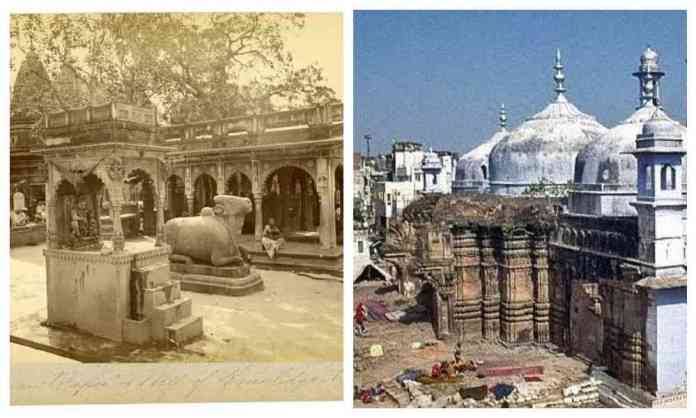Muslim petitioners, mainly mosque administrators, want the petition thrown out and say they are ready to fight till the Supreme Court.
LATEST DEVELOPMENT
The Anjuman Islamia Masjid committee’s appeal against the maintainability of the petition filed by five Hindu women seeking the right to worship in the Gyanvapi mosque enclosure was rejected by a Varanasi court on Monday.
On September 22, District Judge AK Vishvesh rendered a decision in the Gyanvapi Shrinagar Gauri dispute case and set a new hearing date.
Sohan Lal Arya, the petitioner in the Gyanvapi case, declared that it was a victory for the Hindu community. “The next hearing is on September 22. It’s a foundation stone for the Gyanvapi temple. Appeal to everyone to keep peace.”
If the verdict is in their favour, the Hindu side had stated that they will request an Archaeological Survey of India (ASI) survey and carbon dating of the “Shivling.”
CASE SUMMARY
The lawsuit demands the right to pray, next to Kashi Vishwanath Temple within the grounds of the Gyanvapi Mosque.The Gyanvapi complex is where the gods Hanuman, Nandi, and Shringar Gauri were discovered. Additionally, the petition urged that people be forbidden from harming the idols.
The plea rejected today was by The Anjuman Islamia Masjid Committee (AIMC), which oversees the mosque. The Places of Worship Act, 1991 has been used by the committee to cast doubt on the case’s capacity to be maintained. According to the law, it is forbidden to change a house of worship’s religious identity from what it was on August 15, 1947.
The case has its roots in 1991, the same year as the Places of Worship Act. Swayambhu Jyotirlinga Bhagwan Vishweshwar presented the case’s initial plea to the Varanasi court in 1991. In the Gyanvapi compound, the petition claimed the right to practise religion.
CASE HISTORY
A 1991 lawsuit claiming that the Gyanvapi-Kashi temple was destroyed by the Mughals and a 2021 lawsuit by female devotees of Lord Shiva who follow the Vedic Sanatan Hindu dharma seeking “restoration of performance of rituals at principal seat of an Ancient Temple” are both related to the Gyanvapi-Kashi dispute.
In his petition, the petitioner made three demands. The entire Gyanvapi complex was declared to be a part of the Kashi temple, Muslims were expelled from the complex region, and the mosque to be demolished.
In August 2021, Five Hindu devotees petitioned the Varanasi Court for permission to worship the gods Hanuman, Nandi, and Shringar Gauri inside the Gyanvapi complex, bringing the Gyanvapi mosque controversy back into the spotlight. Additionally, the petition urged that people be forbidden from harming the idols.
Then in April 2022 the Varanasi court appointed an advocate commissioner based on the petition submitted in August 2021 and also mandated a videography survey of the complex. The Anjuman Intezamia Masjid Committee appealed the decision in the Allahabad High court once more. But this time, the order was confirmed by the Allahabad High Court.
A day before the AIMC’s advocate filed an application citing the bias of the advocate commissioner Ajai Mishra, a videographic assessment of the complex was started.
On May 12, 2022, the court declined to have Ajai Mishra removed from his position and instead named senior attorney Vishal Singh to oversee the survey. As a special advocate commissioner, he was appointed. The crew was instructed to report all of the survey’s recorded data by May 17.
WHY IS THIS CONTROVERSIAL?
The Kashi Vishwanath Temple is located in the centre of Varanasi, close to the Lalita ghat. The debate centres on whether the Gyanvapi Mosque was constructed after portions of the Kashi Vishwanath Temple’s structures were destroyed.
Now , In a lawsuit brought by Hindu women, it is claimed and stated that the site of Gyanvapi Mosque was formerly a Hindu temple that Mughal Ruler Aurangzeb destroyed before the mosque was constructed. On the other hand, the Muslim side (Anjuman Masjid committee) has stated that the Places of Worship (Special Provisions) Act, 1991 expressly forbids the lawsuit.
THE PUBLIC OPINION
Faith and sentiments of both faiths Hindu and Muslim are invested in the case. On Twitter user @AbhijitMajumder shared “BREAKING: The Muslim side in the #Gyanvapi case urges the district court that the mosque’s video survey findings must not be made public. WHY? WHAT ARE THEY TRYING TO HIDE?”
The verdict holds dire importance as our country is imbedded with multiple similar disputes.












